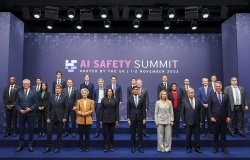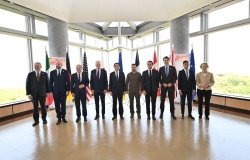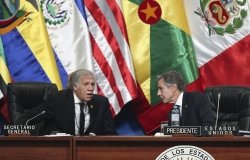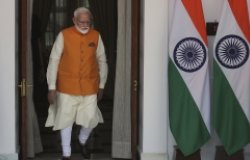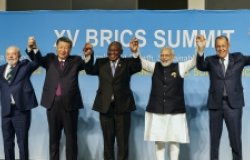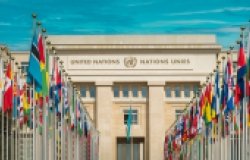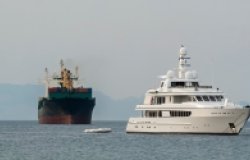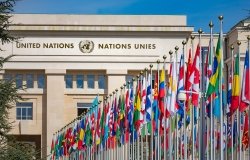Balkan Stability and Security: The Role of International Organizations
Policy Forum featuring Ambassador Richard Schifter and Nenad Sebek of the Center for Democracy and Reconciliation in Southeast Europe.
Overview
Remarks
by Nenad Sebek
Executive Director
Center for Democracy and Reconciliation in Southeast Europe
Since my roots are in the former Yugoslavia, I will allow myself to be harsher on my former countrymen (and women) than might be politically correct to do. So, let me emphasize right away that whatever rights or wrongs were made by the International Community, the responsibility for plunging the region into war, carnage, plunder and rape lies with the peoples and leaders of the former Yugoslavia. The ?what if? scenarios simply do not cut any mustard. If there is blame or guilt to be handed out, the buck stops within the borders of Tito?s Yugoslavia. I reject all notions that it is this or that country?s fault for the catastrophic 1990s. Or that it was this or that conspiracy at work. It was and is the fault of the nations of the former Yugoslavia that they embarked on the road to fratricide.
However while the buck stops where it stops, the International Community DID have its own options and choices to make. It could either stand aside; do too little or too much. Early or late. Do the right thing or do the wrong thing.
During the 1990s, we have seen all possible variations. Case study one - none or next to none in the late ?80s and ?90-91. Had the last pan-Yugoslav government of Ante Markovic been propped up in time by the International Community, not only would tens of thousands of lives have been saved, but also the effort and moneys spent on peacemaking and peacekeeping since 1991. A fraction of that amount COULD have saved lives, property and averted the refugee crisis.
Case two - too much action way too early as shown by the recognition of Slovenia and Croatia in December ?91. While the jury is still out on the wisdom - or lack of it - of this particular move, I belong to the school of thought that says that it was a hurried step and one which triggered the war in Bosnia-Herzegovina.
We then have the case of too little too late as in the case of Bosnia. Action could and should have been taken in 1991, before the war began, but for far too long, the International Community just stood by and did too little.
Also, we have the case of too much, too late ? Kosovo ?99 and the air strikes against Serbia and Montenegro. A timely inclusion of Kosovo on the agenda, for example, in Dayton in the fall of 1995 could have made the Kosovo war redundant and also, once again, the huge costs of rebuilding and peacekeeping through KFOR and UNMIK unnecessary.
Finally, we have a case study, which started off pretty well, but it?s unclear where it will end ? the F.Y. Republic of Macedonia. The initial deployment of a modest UN military contingent went a long way towards keeping peace in the country through the ?90s. But with the Kosovo war and deployment of NATO, the focus shifted and the F.Y. Republic of Macedonia became little more than a logistics base for the Kosovo-based troops. This became painfully clear in the spring of 2001 when the international troops made sure they stayed well clear of the fighting. The zero casualty policy meant that none of the NATO troops would be used in trying to stop that mini war. When they got a meaningful job - disarming ethnic Albanian rebels ? it wasn?t really disarming we?re talking about, it was a case of just registering those weapons that the insurgents were willing to hand over.
Sure, the diplomatic efforts were there, Skopje almost became the EU foreign policy supreme, Javier Solana?s second home. But the achievements are pretty slim. The parties were dragged kicking and screaming to the negotiating table in Ohrid and as for the Framework Agreement ? let me just say this: There is only ONE official version of the agreement. It is in English and not in Macedonian, nor Albanian. If none of the sides could be trusted to translate it properly, can you try and imagine how genuine the sides are going to be about the implementation?
Here in the United States the Balkans are obviously NOT a priority any more. The number of American troops in Bosnia and Kosovo is going down, the high profile missions of the flamboyant Dick Holbrook are but a memory. One of the main points I would like to make here is: Please, don?t do that. Don?t forget the Balkans. They just might come back with a vengeance. The International Community has so much more work to do there and it cannot be accomplished without the active participation of the United States.
What work? Well, before opening the debate I would like to mention but two points.
First help give birth to real democracy. Please, let us not talk about ?restoring democracy,? there was never any democracy in the Balkans to restore. We have to build it up from scratch. We often use the phrase "Fledgling democracies" to describe the Balkan countries. What's the word FLEDGLING most commonly used for? My (and your) Microsoft Word Thesaurus says "baby bird." So, what can we expect from this baby bird? It can?t feed itself, it can?t stand on its own feet, it can?t flap its wings and take off or fly, it's pretty helpless as a matter of fact. So, what are our expectations from the "fledgling democracies," to become democratic societies overnight? To have a free press, free and fair elections, a trustworthy and independent judiciary? To have a state apparatus and a bureaucracy that isn?t corrupt? To respect classic western democratic values? Institutions that MEAN something? To give adequate protection and respect to human rights, minority rights, women?s rights? To? Come on, let's get real here.
Democracy is a state of mind ladies and gentlemen, NOT just a question of holding multi party elections. As a matter of fact, multi party elections per se, WITHOUT solid democratic traditions and institutions, can lead to a catastrophe as we saw in the case of the former Yugoslavia. Elections do NOT a Democracy make! What makes us think that left on its own, a baby bird will survive and thrive? Ahh? you might argue, but we didn?t leave democracy in the post-communist world on its own. We poured zillions of dollars into aid programmes, education, legislation, liberalization, free-marketization and all the other -ations. Indeed, we did. Is there anyone here in this room who believes that all those zillions ended up being used in the right way? Is there anyone in this room who believes that we poured enough of those zillions? Is there anyone in this room who believes that those societies were READY to absorb those zillions in the right way with the right purpose in mind? Is there anyone in this room who believes that we can preach democracy before we feed the stomach? We are NOT "restoring" democracy. We are trying to grow that delicate plant on barren earth under very unfavourable climatic conditions and with very little rain or sunshine. So, let's get rid of the fiction and deal with reality, and the reality is bad. We will only make fools of ourselves, and waste yet more zillions and yet more time if we do not accept the reality for what it is. This brings me to my second main point. The second main job of the international community, to deal with reality rather than fiction.
For far too long, in the Balkans, the International Community, has chosen to see what it wants to see simply because it was politically correct to do so. The only GENUINE, EFFECTIVE solutions can be the ones that are based on the reality, no matter how nasty that reality is. Because we started believing in the fiction, we often ended up applying the wrong medicine. When dealing with what effectively is ? allow me to use the four letter word ? nation building in Iraq or Afghanistan, the US would well be advised to look at the similar experiences in the Balkans.
Hurried elections ? we wanted to have them in Bosnia as soon as possible, and we did, less than a year after Dayton. What is the consequence? Despite all the electoral engineering by the OSCE, the nationalist parties kept winning time, after time, after time. Maybe we would have been better off banning political parties and openly running Bosnia like a protectorate rather than pretending to have a democratic, parliamentary system. Please let us remember, every single one of the major decisions in Bosnia was NOT taken by parliament, but rather imposed by the Proconsul or the High Rep. as we call him there. Kosovo, yet again, there was a rush to build a functioning democracy by 5 pm, and a multiethnic society preferably by 4pm. Well, the March unrests got rid of that illusion at least.
Whether we want it or not, we have two dysfunctional nascent states in the Balkans ? Bosnia and Kosovo, both rife with corruption, organized crime, interethnic intolerance and an economy which is anything but viable. The unemployment rates in Bosnia go as high as 70% in some regions, and the labour market in Kosovo is hit every year with a fresh crop of 35 thousand that just top up the unemployment total. We have a third country ? Serbia and Montenegro that doesn?t know if it?s a country or not and if yes, for how long. It also doesn?t know where its borders are. We also have the F.Y. Republic of Macedonia - poor, peaceful and totally dependant on what happens in the neighborhood when it comes to very survival. This is NOT a time to pull out of the Balkans, it is a time to regroup the efforts by the International Community and do more. Do what? Well, recognize for example the fact that many, if not all, international institutions in the region are themselves troubled with inefficiency and corruption. I am not at liberty to say names, but a very high international official told me a couple of weeks ago that the way UNMIK is set up, it simply can NOT work. That, one couldn?t run a family with two kids that way, let alone a two million strong protectorate.
Let us remember one thing, PRE-conflict investment and diplomacy is MUCH cheaper then POST-conflict management, peacemaking and peacekeeping. Not to mention the feeding and housing of refugees and dealing with the consequences of forced migrations or ethnic cleansing as we call it nowadays.
Hosted By

Global Europe Program
The Global Europe Program is focused on Europe’s capabilities, and how it engages on critical global issues. We investigate European approaches to critical global issues. We examine Europe’s relations with Russia and Eurasia, China and the Indo-Pacific, the Middle East and Africa. Our initiatives include “Ukraine in Europe” – an examination of what it will take to make Ukraine’s European future a reality. But we also examine the role of NATO, the European Union and the OSCE, Europe’s energy security, transatlantic trade disputes, and challenges to democracy. The Global Europe Program’s staff, scholars-in-residence, and Global Fellows participate in seminars, policy study groups, and international conferences to provide analytical recommendations to policy makers and the media. Read more
Thank you for your interest in this event. Please send any feedback or questions to our Events staff.

